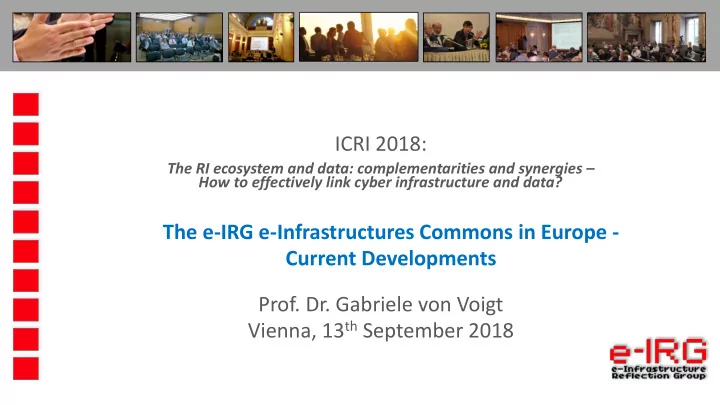

ICRI 2018: The RI ecosystem and data: complementarities and synergies – How to effectively link cyber infrastructure and data? The e-IRG e-Infrastructures Commons in Europe - Current Developments Prof. Dr. Gabriele von Voigt Vienna, 13 th September 2018
e-Infrastructure Commons EOSC Prof. Dr. Gabriele von Voigt The e-IRG e-Infrastructure Commons - Current Developments 2
Innovation potential of data Data is the cross-section between RIs and e-Infrastructures RI data can be re-used to create new knowledge, new services, new products with the support of e-Infras and ICT tools (analytics, machine learning, etc.) Example of innovation potential: big data analytics on research data and public sector information This highlights the importance of trusted data management and FAIR+R data (Findable, Accessible, Interoperable, Reusable + Reproducible) FAIR (by FORCE11) and initiatives in Europe (GO FAIR, FAIR Data Expert Group,..) Prof. Dr. Gabriele von Voigt The e-IRG e-Infrastructure Commons - Current Developments 3
Innovation in e-Infrastructures e-Infras: combination of innovation and operational components e-Infrastructures should be at the edge of technology, and ahead of commodity/commercial services (innovation aspect), and provide stable, reliable, sustainable services (operational aspect) Digital innovation hubs to be used in e-Infrastructures (EOSC/EGI – EUDAT – INDIGO-DataCloud) aim to bring all stakeholders together and promote innovation Prof. Dr. Gabriele von Voigt The e-IRG e-Infrastructure Commons - Current Developments 4
e-IRG Roadmap 2016 Two recommendations are directed at national governments and funding agencies. They should reinforce their efforts to: embrace e-Infrastructure coordination at the national level and build strong national e-Infrastructure building blocks, enabling coherent and efficient participation in European efforts, especially in alignment with the FAIR principles concerning data and services ; together analyze and evaluate their national e-Infrastructure funding and governance mechanisms, identify best practices, and provide input to the development of the European e-Infrastructure landscape . Prof. Dr. Gabriele von Voigt The e-IRG e-Infrastructure Commons - Current Developments 5
The e-IRG National Nodes publication (work in progress) Background: Follow-up of e-IRG Roadmap 2016 and its two recommendations These recommendations also appear in the Competitiveness Council conclusions (28/29 May 2018): “ENCOURAGES Member States to invite their relevant communities, such as e- infrastructures, research infrastructures , RFO’s and RPO’s, to get organized so as to prepare them for connection to the EOSC and CALLS ON the Commission to make optimal use of ongoing projects, existing expertise and knowledge available via existing initiatives, such as ESFRI, eIRG , GO FAIR and others” Scope: Analysis of the current status in the EU countries and develop recommendations/name good practices towards national e-Infra Commons, to ease integration at EU level Process: Questionnaire via e-IRG members on the organisation of national e-Infras (including data infrastructures) and their coordination for national horizontal (generic) e-Infras and domain- specific national nodes Prof. Dr. Gabriele von Voigt The e-IRG e-Infrastructure Commons - Current Developments 6
The e-IRG National Nodes publication (2) Current replies from 27 countries Publication will be presented at the e-IRG Workshop in Vienna (20-21 Nov) Attached to the EOSC Stakeholder Forum, EOSC launch event (21-23 Nov) Prof. Dr. Gabriele von Voigt The e-IRG e-Infrastructure Commons - Current Developments 7
The e-IRG National Nodes publication (3) Preliminary outcomes Today some countries have a single coordinating e-Infra service entity data infrastructures are usually separate from computing and networking ones; sometimes even competing entities Access to resources (especially computing and storage) is mostly national In most cases horizontal data infrastructures are not available or not coordinated or organised at the domain (discipline)-level Large variety in governance and involvement of stakeholders (ministries, research funders, universities, research communities) Prof. Dr. Gabriele von Voigt The e-IRG e-Infrastructure Commons - Current Developments 8
The e-IRG National Nodes publication (4) Preliminary outcomes Some countries have on-going processes aiming at coordination of e-Infras initiatives and/or coordination of e-Infras and domain RIs Some countries describe interesting mechanisms to channel funding streams to horizontal e-infrastructures, with involvement of research communities etc. A few countries have good level of coordination and good data access policies There are examples of bottom-up multi-stakeholder coordination of both generic (network-computing-data) and domain-specific ones As part of a forum with the corresponding ministry as an observer Best practices for other countries! Prof. Dr. Gabriele von Voigt The e-IRG e-Infrastructure Commons - Current Developments 9
Conclusion On-going national/EU/international efforts for harmonizing e-infrastructures & RIs major role of governance and coordination sustainability and funding question data as the common currency between e-Infras &RIs quality, trust, management and handling in connection to FAIR+R data EOSC, EuroHPC and the connected initiatives Easy access for researchers to all services loosely integrating compliant services from all providers; to become a marketplace! The national building blocks are key for their success! Prof. Dr. Gabriele von Voigt The e-IRG e-Infrastructure Commons - Current Developments 10
Thank you for your attention! For further information see e-irg.eu Special thanks to all e-IRG delegates contributing to this presentation e-IRG is supported by e-IRGSP5 http://e-irgsp5.e-irg.eu Prof. Dr. Gabriele von Voigt The e-IRG e-Infrastructure Commons - Current Developments 11
Recommend
More recommend